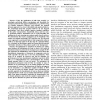Free Online Productivity Tools
i2Speak
i2Symbol
i2OCR
iTex2Img
iWeb2Print
iWeb2Shot
i2Type
iPdf2Split
iPdf2Merge
i2Bopomofo
i2Arabic
i2Style
i2Image
i2PDF
iLatex2Rtf
Sci2ools
ADT
2006
2006
Rethinking end-to-end failover with transport layer multihoming
Using the application of bulk data transfer, we investigate end-to-end failover mechanisms and thresholds for transport protocols that support multihoming (e.g., SCTP). First, we evaluate temporary failovers, and measure the tradeoff between aggressive (i.e., lower) thresholds and spurious failovers. We surprisingly find that spurious failovers do not degrade performance, and often actually improve goodput regardless of the paths' characteristics (bandwidth, delay, and loss rate). A permanent failover mechanism tries to avoid throttling the sending rate by not returning to a primary path when it recovers. We demonstrate that such a mechanism can be beneficial if the sender can estimate each path's RTT and loss rate. We advocate a new approach to end-to-end failover that temporarily redirects traffic to an alternate path on the first sign of a potential failure (i.e., a timeout) on the primary path, but conservatively proceeds with failure detection of the primary path in the ...
| Added | 10 Dec 2010 |
| Updated | 10 Dec 2010 |
| Type | Journal |
| Year | 2006 |
| Where | ADT |
| Authors | Armando L. Caro Jr., Paul D. Amer, Randall R. Stewart |
Comments (0)

